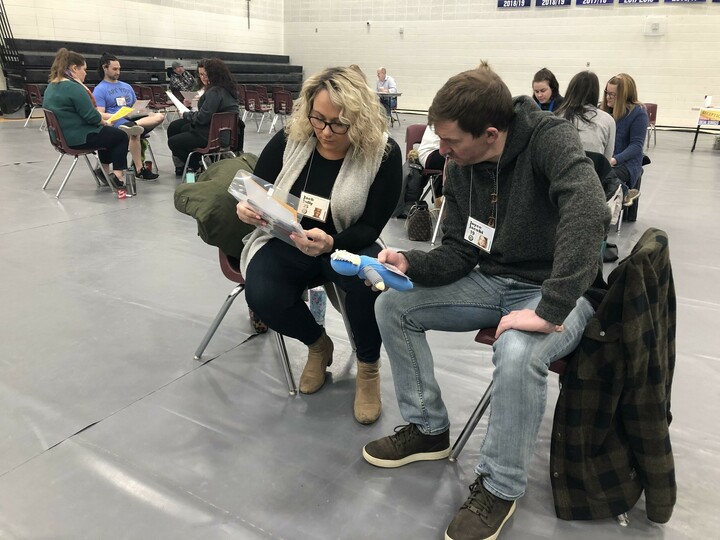
As part of its commitment to improving the mental health and wellness of students, Northern Lights Public Schools ran six simultaneous poverty simulations on Wednesday, February 12 to strengthen staff understanding of poverty and its effects on families.
Each of the six simulations involved approximately 80 staff members who were assigned roles as members of families. A variety of ages and family compositions were represented. Each family was given a specific set of circumstances and a variety of resources (money, transportation passes, etc.) to use throughout the course of a month. During the simulation they had to find and maintain employment, pay mortgages, loans and utilities, ensure children were cared for and/or attending school, and purchase food and necessities, as well as fulfill any special challenges they were given.
The experience was both challenging and emotional for staff. One participant pointed out that everyone was very stressed during the simulation, and that it would be even more stressful for people who were really living in poverty. Other observations included:
- "It was impossible to get everything done."
- "Transportation was very challenging."
- "We were amazed at our willingness to steal."
- "Our children didn't get to go on field trips and things that other kids did."
- "It makes me wonder what happens to our students when they aren't with us."
Most families felt they were worse off at the end of the month than they were at the beginning. Almost none were able to purchase food every week. When asked if they had time to do something fun or spend quality time as a family, no one raised their hands.
Some staff had the opportunity to play roles associated with community services such as police officers, bankers, employment agencies, social services, and pawn shop owners. Many of them were frustrated that they either didn't have the resources to help the families with what they needed, or had resources that could help but no one was accessing them.
"We need to be aware of what services are available in our communities and realize that some people may not be aware of what is available to them," commented one staff member.
Providing staff with the opportunity to strengthen understanding and empathy by participating in a poverty simulation is one of the strategies identified in the division's plan to improve student mental health and wellness. Student mental health and wellness was established as a priority by the NLPS Board after extensive stakeholder engagement during the 2018-2019 school year and is included in the division's 2019-2022 Three-Year Education Plan. More details about the strategies we are using at the division and school levels to address student mental health and wellness can be found on our Mental Health and Wellness page.
The poverty simulation was made possible with the support of the Alberta Health School Community Wellness Fund, Successful Families, Successful Kids project, and Lac La Biche County.